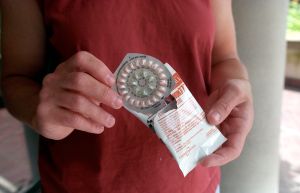
Source: Tim Matsui / Getty
A major move to broaden birth control options for women in the military is taking shape in both houses of Congress as they move forward to make contraceptives accessible on a larger scale, the New York Times reports.
An annual defense policy bill says women should “have access to a sufficient supply” of birth control during their deployment, the site writes. It also states that “military clinics and hospitals must be able to dispense any method of contraception approved by the Food and Drug Administration.”
Women in the military have a higher rate of unplanned pregnancies, according to Representative Jackie Speier, Democrat of California, who supports the reform. Troops have often complained that they are unable to access contraceptives, especially if deployed overseas.
From the NYT:
“Servicewomen deserve access to the same array of contraceptive methods available to civilians,” Ms. Speier said. “My amendment would ensure that military bases stock a broad range of contraceptive options, so a trip to the pharmacy isn’t a game of chance.”
The Senate Armed Services Committee approved a companion bill last week after adopting amendments proposed by Senator Jeanne Shaheen, Democrat of New Hampshire, to increase access to birth control for women in the military and others covered by military health programs. “Almost 15 percent of our military are now women,” she said. “But the military has not developed a comprehensive program to make sure they have access to family planning, contraception and counseling.”
Mrs. Shaheen’s proposal would require the Defense Department to give women the most up-to-date “standard of care,” reflected in clinical guidelines on contraception and counseling issued by groups like the Centers for Disease Control and Prevention and the American College of Obstetricians and Gynecologists.
Advocates of such proposals point to the Navy policy of screening “female sailors for contraceptive needs before they go to sea,” although numbers show that one in four enlisted women of reproductive age have still had an unplanned pregnancy in the last 12 months.
While daily or weekly contraceptives are at the center of the new effort to broaden birth control options, at least one military health care expert says the government should explore “long-acting contraceptives” like intrauterine devices.
But whatever a woman decides, the government must remember that the 97 percent of women of reproductive age in the military have a choice. And the choice should be all their own.
You can read more on the new expansion here.
SOURCE: NYT, Military Times | PHOTO CREDIT: Getty
SEE ALSO:
























